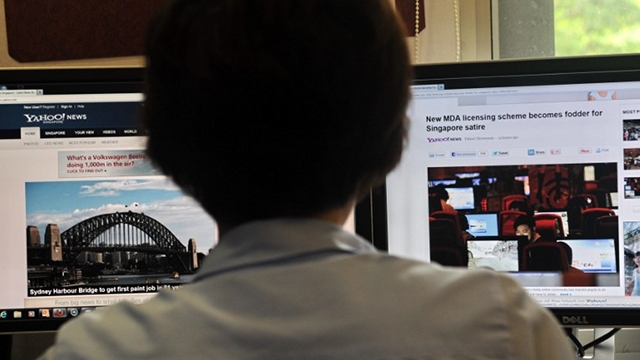SUMMARY
This is AI generated summarization, which may have errors. For context, always refer to the full article.

SINGAPORE – Human Rights Watch urged Singapore on Friday, June 7, to drop new licensing rules for news websites, saying the “onerous” regulations would limit access to independent media.
The new rules, which require popular news websites to obtain an annual license, will discourage independent reporting and curb free expression in online communities, the US-based watchdog said in a statement.
Volunteer-run blogs focusing on social and political issues including poverty and immigration have gained popularity as an alternative source of news and opinion in Singapore, where the mainstream media is widely seen as pro-government.
These blogs and other online social media sites have also been used by citizens to vent their frustrations and criticisms of government policies, often setting the tone for political debate in a country governed by strict laws against dissent.
“The Singaporean government should withdraw an onerous new licensing requirement for online news sites,” Human Rights Watch said in a statement.
Cynthia Wong, the organization’s senior Internet researcher, added: “Singapore’s new licensing requirement casts a chill over the city-state’s robust and free-wheeling online communities, and will clearly limit Singaporeans’ access to independent media.”
She warned that the new rules could harm Singapore’s reputation as a business center.
“Singapore is placing its status as a world-class financial center at clear risk by extending its record of draconian media censorship to the digital world.”
Civil society opposes rules, too
Four Southeast Asian civil society groups also issued a joint statement Friday criticizing the new rules.
“We contend that the measures have the potential to curtail the rights to the freedom of expression and information online,” said the statement issued by the Asian Forum for Human Rights and Development, Southeast Asian Press Alliance, Southeast Asian Centre for e-Media and Think Centre.
The statement added it was “highly regrettable that the authorities have chosen to tighten its grip on online space in a country where traditional media outlets have been subjected to strict controls”.
Under the rules, which kicked in on June 1, websites with at least 50,000 unique visitors from Singapore every month that publish at least one local news article per week over a period of two months must obtain an annual license.
Websites granted a license will have to remove “prohibited content” such as articles that undermine “racial or religious harmony” within 24 hours of being notified by Singapore’s media regulator, the Media Development Authority.
Netizens to hold rally
The rules have caused an uproar in the online community, which largely sees it as a measure to muzzle freedom of speech.
More than 130 Singaporean bloggers blacked out their homepages on Thursday and will hold a rally on Saturday to protest the new rules.
But Singapore’s media regulator and other government officials have sought to allay fears that the new rules will impinge on Internet freedom.
Minister for Communications and Information Yaacob Ibrahim said Tuesday the government would continue to take a “light touch” approach to regulating the Internet and noted that blogs were not covered by the rules as they are not considered news portals.
“I think the best way for people to see, after the licenses are issued, is whether the activists are indeed limited in their public discourse,” Yaacob said.
“I hope that the activists who are today making this far-fetched claim will be honest enough to admit it when the time comes.” – Rappler.com
Add a comment
How does this make you feel?
There are no comments yet. Add your comment to start the conversation.